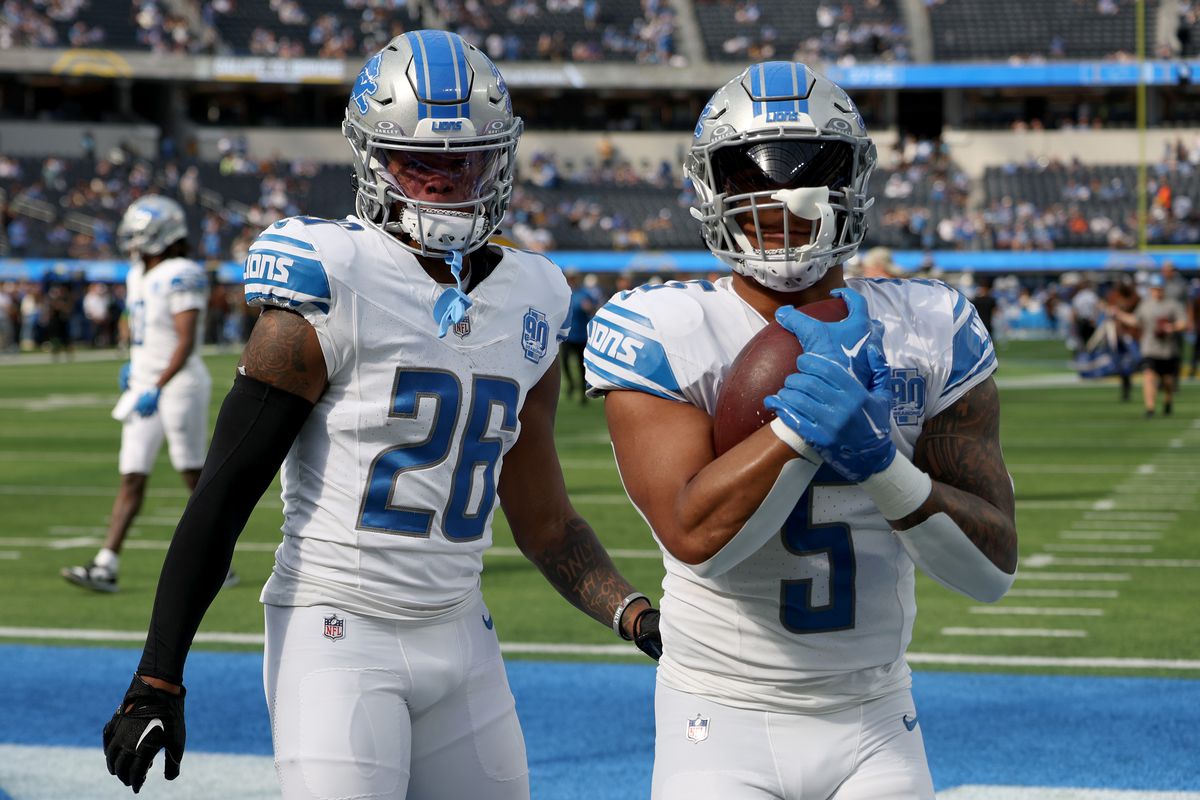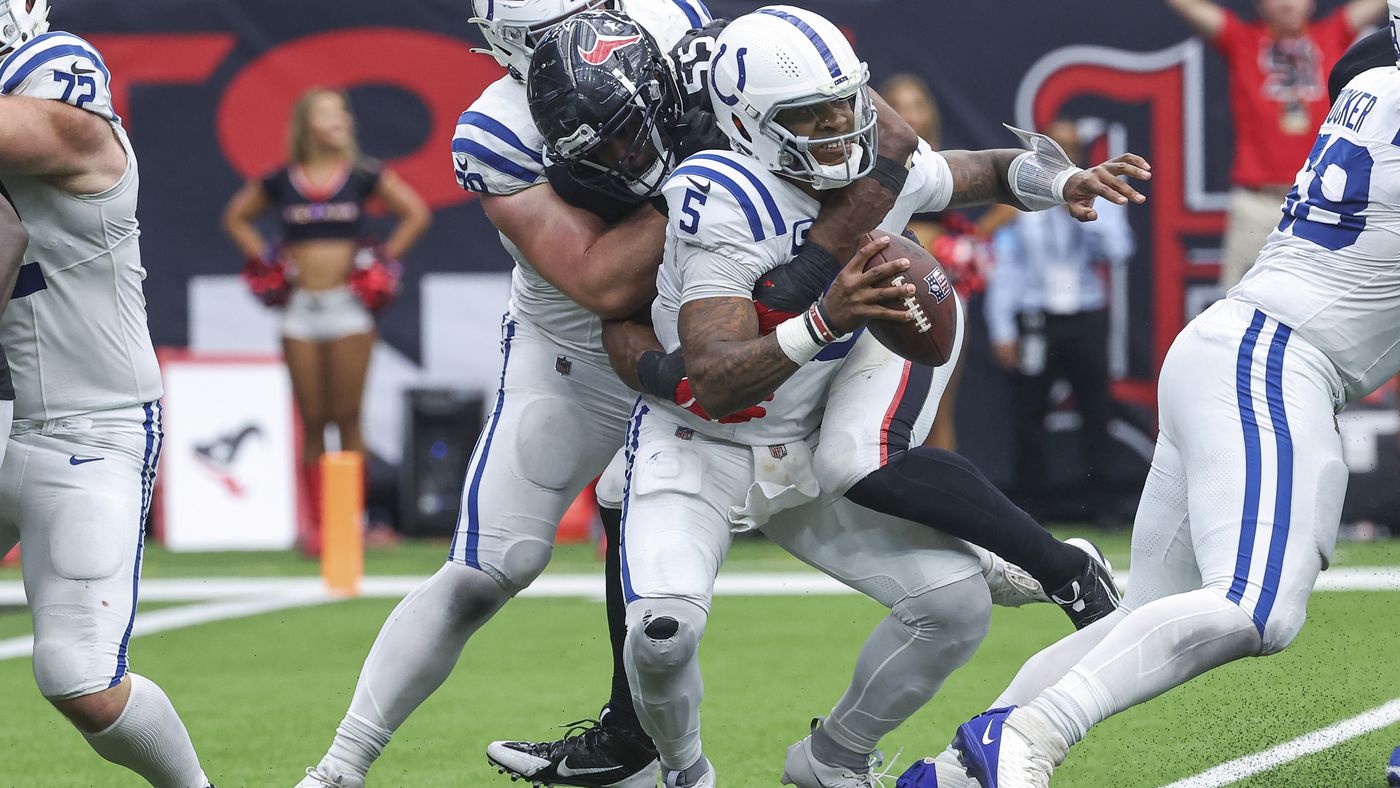In Week 10, the Detroit Lions (7-1) face the Houston Texans (6-3) in a crucial road game that will test their ability to continue their strong season. As the Lions aim to stay on track for a playoff spot, they’ll rely on their established keys to victory. These strategies, outlined in their “Honolulu Blueprint,” focus on controlling the game through physicality, solid defensive play, and efficient execution on both sides of the ball.
First and foremost, Detroit will need to establish its rushing attack early in the game. On the road, the Lions typically gain 41 more rushing yards than their opponents allow on average, showcasing their ability to control the ground game. With one of the NFL’s best two-headed running back systems, featuring David Montgomery and Jahmyr Gibbs, Detroit can set the tone by forcing the Texans’ defense to respect the run. While Houston’s rushing defense is statistically efficient, they give up big plays on the ground, making them vulnerable to Detroit’s talented backs who excel at breaking tackles and gaining yards after contact.
In contrast, Detroit’s offensive line will face a significant challenge against Houston’s formidable pass rush. The Texans have the second-highest pressure rate in the league, with standout edge rushers Danielle Hunter and Will Anderson creating havoc in opposing backfields.
Even though Anderson will be sidelined due to injury, Hunter remains a threat, and the Lions will need to protect quarterback Jared Goff, who has been excellent under pressure this season. Despite the absence of left tackle Taylor Decker, Detroit’s offensive line has been solid, and Goff has shown remarkable efficiency when facing pass rushes, ranking first in the league in several key passing categories.

On defense, the Lions will need to contain Houston’s running game, particularly with Joe Mixon, who has been on a hot streak since returning from injury. Mixon has rushed for over 100 yards in four consecutive games, making him a significant threat. The Lions will need to focus on setting the edge and preventing Mixon from finding cutback lanes, which have been a key part of his success.
Additionally, Detroit must take advantage of Houston’s weak interior offensive line, which has struggled in both run blocking and pass protection. The Lions’ defense has been effective at stopping the run, and they’ll look to use this to their advantage against a Texans offensive line that has allowed significant pressure up the middle.
The key to slowing down the Texans’ offense will also involve controlling their young quarterback, C.J. Stroud. While Stroud has impressed with his ability to extend plays and keep his eyes downfield, he’s been under constant duress due to Houston’s porous offensive line. The Lions should look to exploit this weakness by collapsing the pocket and using blitzes, especially up the middle, where the Texans are most vulnerable. Detroit’s defense, known for its ability to generate turnovers, will need to capitalize on any mistakes made by Stroud, particularly if he’s forced into difficult situations under pressure.

While Stroud’s mobility allows him to escape the pocket, the Lions’ defensive game plan will need to include keeping him contained and focused on making quick decisions. The Texans have been blitzed frequently this season, but their offensive line struggles to handle pressure. The Lions’ defensive front, led by Alim McNeill and their linebacker corps, should focus on creating pressure from the middle and disrupting Stroud’s ability to make plays downfield. Stroud’s chemistry with wide receiver Nico Collins could be an X-factor in this game, but with Collins returning from injury and missing practice time, their connection may not be as sharp as it could be, giving the Lions an opportunity to disrupt the Texans’ deep passing game.
The Lions’ secondary has been one of the league’s best at generating turnovers, with safeties Kerby Joseph and Brian Branch leading the league in interceptions. Stroud’s deep-ball connections with Collins will be tested, as the Texans’ passing game has struggled with consistency. The Lions will look to continue their strong play in the secondary, taking advantage of any miscommunications or poorly timed throws from Stroud. Detroit’s ability to force turnovers could play a crucial role in determining the outcome of this game.
Houston’s defense, under head coach DeMeco Ryans, is known for being well-coached and aggressive, particularly in the front seven. While they can be a strong unit against the run, their tendency to over-commit to the pass rush can leave them vulnerable to big plays in the running game. The Lions will look to exploit this by using draws and traps to break through Houston’s defensive front and gain significant yardage on the ground. Detroit’s offensive line will need to be disciplined in handling the aggressive pass rush while also creating lanes for Montgomery and Gibbs to run through.
Ultimately, the Lions’ success in this game will hinge on their ability to control the line of scrimmage, both on offense and defense. By maintaining a balanced attack with the running game and keeping Goff clean in the pocket, Detroit can neutralize Houston’s defensive strengths. At the same time, the Lions’ defense must focus on shutting down the Texans’ rushing attack, pressuring Stroud, and forcing turnovers. With a combination of solid offensive execution and defensive discipline, the Lions have a good chance to extend their win streak and secure another important road victory.
